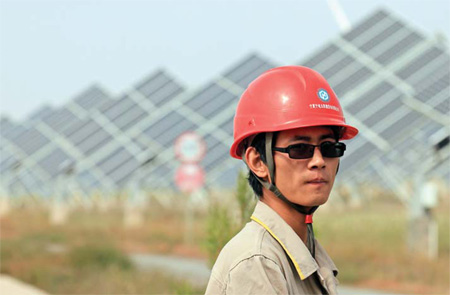EU woes cast shadow on Durban talks
Updated: 2011-11-25 08:53
By Lan Lan and Li Jing (China Daily)
|
|||||||||
|
A Chinese technician monitors a solar panel field operating in the Taiyangshan Development Zone in Wuzhong, Ningxia Hui autonomous region, which is China's largest clean energy base. Xie Zhenhua, vice-minister of the National Development and Reform Commission, said China will firmly adhere to its commitments and policies on combating climate change despite the global financial turmoil. Stephen Shaver / Photo via CFP |
Global consensus on climate change plan necessary to move forward, make a difference, many say
Climate change talks in Durban, South Africa, could help orientate the direction of international climate control talks, though a breakthrough is unlikely as worldwide financial woes have cast a shadow over the meeting.
Expectations for big progress from the meeting, which starts Monday, have been lowered because of the uncertain economic outlook and differing policy positions held by some nations.
Xie Zhenhua, vice-minister of the National Development and Reform Commission and head of the Chinese delegation to the Durban meeting, called for all nations to adopt an "active and constructive" attitude toward the Durban meeting to yield tangible results.
"Countries have encountered economic problems since the financial crisis, but these difficulties are temporary. Climate change hasn't become less important because of the international financial crisis, just less prominent," Xie said.
The National Development and Reform Commission, China's top economic planning agency, also oversees China's greenhouse gas emission reduction, energy efficiency and sustainable development.
"Addressing climate change is a long-term effort while the world's financial woes are temporary," he said.
China's commitments and policies on combating climate change will be firmly adhered to despite the global financial turmoil, Xie said.
According to its 12th Five-Year Plan (2011-2015), China is planning to reduce carbon dioxide emission per-unit GDP by 17 percent and energy consumption per-unit GDP by 16 percent as compared with that in 2010.
He Jiankun, a laboratory director who specializes in low-carbon energy at Tsinghua University, stressed the importance of the Durban meeting.
"It will be hard to reach any exciting breakthroughs at the Durban meeting, but the meeting is critical as it will set the direction and regime for future international climate change negotiations," He said.
Developing countries insist on the double-track negotiation mechanism - the UN Framework of Climate Change Convention and the Kyoto Protocol - while some developed countries intend to combine the two. Disputes over this issue are expected to be heated at the meeting.
The fate of a second commitment of the Kyoto Protocol, as its first terms are set to expire next year, will be the "most crucial and critical issue" of the Durban meeting as nations hold various positions, Xie said.
China, along with other developing countries, holds the position that the Kyoto Protocol should continue and there shouldn't be a gap between the two commitment phases, according to the previous agreements.
He called on the European Union to continue to "take a leading role" in addressing climate change and said European countries such as Germany have done an excellent job in combating climate change both in policies and actions.
Zhang Haibin, an associate professor at Peking University, was not so optimistic. Because Europe is still struggling to find a way out of the eurozone financial crisis, the structure of international climate negotiations will be severely affected, Zhang said.
"If we look at previous talks, any progress that has been achieved has had something to do with EU leadership," he said. "But with its increasing financial vulnerability, the EU is not likely to be really active and assume greater responsibility this time."
The United States hasn't agreed to the Kyoto Protocol, although it has also pledged to cut greenhouse gas emissions by 17 percent by 2020. But it is doubtful Washington will make any legally binding commitments now or in the coming years, he said.
It is unlikely major progress will be made in Durban, Zhang added.
The EU wants a second commitment period for the climate change agreement, provided China and the US seek major cuts in the coming years.
Under the principle, rich nations with a history of industrialization should substantially cut their greenhouse gases and provide funding and technological support for developing countries to make voluntary reductions in their emissions.
But developed countries have been pushing the leading emerging economies - China, India, Brazil and South Africa - to shoulder more responsibility as their emissions have risen in step with their growing economic clout.
China has become the world's top carbon emitter over the past several years, overtaking the US. The country was called to take on more responsibilities and play a leadership role to bridge the gap between rich and poor countries.
But the reason for top ranking is mainly because of China's huge population, said Martin Khor, executive director of the South Center China, an intergovernmental policy think tank for developing countries.
With a total of 7,232 megaton of carbon dioxide (CO2) equivalent, China was the top greenhouse gas emitter in 2005, followed by the US and India, Khor said.
But in terms of per capita, China's emissions level was 5.5 CO2-equivalent per person, ranking 84th in the world, much lower than the US' per capita emission of 23.4 CO2-equivalent, Australia's 27.3, Canada's 22.9 and Russia's 13.7.
"China is still a middle-level developing country. If China is pressured to take on the duties of a developed country and to forgo its status and benefits of a developing country, then many other developing nations that are ahead of China may soon be also asked to do the same," Khor said.
China has stepped up its efforts to reduce its greenhouse gas emissions, promoting low-carbon development and addressing climate change. The country hopes to reduce the per-unit GDP greenhouse gas emission in 2020 by 40 to 45 percent from 2005 levels.
"We will not let our carbon emissions grow unchecked and repeat the mistakes of rich countries during their industrialization," Xie said.
Xie said China is willing to reconsider its role in the UN Framework of Climate Change Convention beyond 2020, based on scientific reviews on global warming to be published in 2015.
"China is willing to shoulder its due obligations consistent with its development stage, but the fundamental principle of 'common but differentiated responsibilities' needs to be upheld," he said.
Both developed and developing countries are obliged to adopt measures to adapt to climate change, but given the historical responsibilities and stage of development, developed countries need to take the lead in reducing emissions and provide financial support to developing countries, he said.
Under an arrangement reached in Copenhagen in 2009, developed nations pledged $30 billion (22 billion euros) by 2012 and $100 billion by 2020 to help developing countries deal with climate change.
The establishment of the Green Climate Fund is among the positive outcomes of last year's climate talks in Cancun, Mexico.
The Green Climate Fund is on the agenda for the Durban meeting because long-term financing needs to be addressed. Although money for the fund might fall short under the current economic situation, progress could be made in finding ways to allocate and manage the fund, Xie said.
Samantha Smith, head of World Wildlife Fund's Global Climate and Energy Initiative, said synergy of political will is the only solution to break the climate change agreement deadlock.











